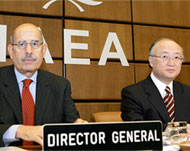IAEA cameras taken off Iran N-sites
Inspectors from the UN nuclear watchdog agency have stripped most surveillance cameras and agency seals from Iranian nuclear sites and equipment as demanded by Tehran in response to its referral to the UN Security Council, according to diplomats.

The diplomats, who demanded anonymity in exchange for revealing the confidential developments, said on Saturday the move was part of retaliatory measures announced by Iran that have left the International Atomic Energy Agency with only the most basic means to monitor Iran‘s nuclear activities.
It came as Iran‘s president suggested his country might even pull out of the Nuclear Nonproliferation Treaty, which North Korea left three years shortly before it went public with its nuclear weapons programme.
With most surveillance equipment and seals from Iran’s nascent uranium enrichment facilities at Natanz now removed – and Iran recently ending the agency’s rights to in-depth nuclear probes at short notice – the IAEA has few means to monitor the progress of Tehran‘s enrichment efforts, which can create either nuclear fuel or the fissile core of warheads.
It also is crippled its efforts to look for secret sites and experiments that could be linked to nuclear arms.
The agency still has some seals and equipment at Natanz and Isfahan, where Iran is converting raw uranium into the feedstock gas for enrichment under basic agreements that are linked to Iran‘s ratification of the Nuclear Nonproliferation Treaty.
Ongoing efforts
Still, with those agreements only meant to monitor Iran‘s declared and existing nuclear stocks, they are considered inadequate in the agency’s ongoing efforts to establish whether the country has tried to develop a nuclear weapons programme at undeclared facilities.
A diplomat familiar with IAEA efforts in Iran said the cameras and seals were removed within “the last day or so” by a team of inspectors now in Iran in compliance with a written Iranian demand presented to the agency less than a week ago.
 |
|
IAEA has reported Iran’s case |
That request to IAEA head Mohamed El-Baradei came two days after IAEA’s 35-nation board of governors reported Tehran to the Security Council on 4 February over its decision to resume enrichment activity and suspicions that its atomic programme represented a threat to world peace.
Iran also announced a sharp reduction in the number and kind of IAEA inspections.
Iranian officials had repeatedly warned they would stop honouring the so-called Additional Protocol to the Nuclear Nonproliferation Treaty if the IAEA board referred their country to the council.
The Additional Protocol had given the agency extra inspecting powers that allowed for inspections on short notice of areas and programmes suspected of being misused for weapons activity.
North Korea – the world’s other major proliferation concern – quit the Nonproliferation Treaty in January 2003, just a few months before US officials announced that Pyongyang had told them it had nuclear weapons and may test, export or use them depending on US actions.
Honouring treaties
Iranian officials have previously said they will continue honouring the Non-proliferation Treaty.
Still, the agreements linked to that treaty are insufficient for agency inspectors trying to establish whether Iran has had a secret nuclear arms programme.
 |
|
Ahmadinejad hinted that Iran |
And even the commitment to the Nonproliferation Treaty was in doubt on Saturday, after Mahmoud Ahmadinejad, the Iranian president, suggested his country might walk away from it.
“Until now, we have worked inside the agency (International Atomic Energy Agency) and the NPT (Nuclear Non-proliferation Treaty) regulations,” he told tens of thousands of Iranians massed in Azadi Square in the Iranian capital to mark the 27th anniversary of the Islamic Revolution, which brought a Muslim theocracy to power.
“If we see you want to violate the right of the Iranian people by using those regulations (against us), you should know that the Iranian people will revise their policies. You should do nothing that will lead to such a revision in our policy,” said Ahmadinejad.
Potential threat
The Iranian president did not specify what changes Tehran envisioned, but it was believed to be a threat to withdraw from the NPT and the IAEA.
But even if Iran stopped short of quitting the Non-proliferation Treaty, just curtailing the voluntary cooperation mandated by the Additional Protocol means that ElBaradei is now stymied in trying to close the Iran nuclear file by March. And that could backfire on Tehran.
Russia and China agreed to Security Council referral on condition that the council take no action until March, when the IAEA board next meets.
But if ElBaradei reports to that 6 March meeting that he was unable to make progress in establishing whether Iran constitutes a nuclear threat, the council will likely start to pressure Iran, launching a process that could end in sanctions.